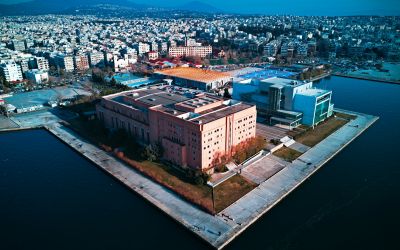Desertification COP16 Ends Without Binding Agreement on Response to Drought
The last two months have seen a trio of UN COP Summits take place, with United Nations Convention to Combat Desertification (UNCCD) COP16 concluding on Saturday.

This year’s crucial UN-led negotiations have lacked the levels of success required, with Colombia’s biodiversity COP16 suspended with plans to resume in 2025 and Azerbaijan’s COP29 resulting in a disappointing climate finance goal. Desertification COP16 followed suit, ending without an agreement on a legally binding response to drought.
UNCCD COP16 Agreements
This desertification summit was the largest land conference to date, with nearly 200 countries, and over 20,000 participants convening in Riyadh, Saudi Arabia. It was also the first time a UNCCD COP was held in the Middle East and North Africa (MENA) region, which is experiencing firsthand the impacts of desertification, land degradation and drought.
Negotiations scheduled to conclude on Friday (13 December) came to an end early on Saturday morning.
The convening countries committed to prioritise land restoration and drought resilience, both in national policies and international cooperation, as an essential strategy for food security and climate adaptation.
Main agreements reached at COP16 include the Caucus for Indigenous Peoples and a Caucus for Local Communities to ensure that their unique perspectives and challenges are adequately represented.
The declaration ‘Sacred Lands’, presented during the inaugural Indigenous Peoples’ Forum at a UNCCD COP, underscored the role of Indigenous Peoples in sustainable resource management and called for greater involvement in global land and drought governance, including through participation in land restoration efforts.
As UNCCD COP16 President, Saudi Arabia announced the launch of an international sand and dust storm monitoring initiative. The initiative is a key component of the Riyadh Action Agenda and part of a regional early warning system, which aims to complement existing efforts overseen by the World Meteorological Organisation (WMO).
The International Drought Resilience Observatory (IDRO), an initiative of the International Drought Resilience Alliance (IDRA), was launched as the first global AI-driven platform to help countries assess, and enhance, their capacity to cope with harsher droughts.
However, whilst the nations “made significant progress in laying the groundwork for a future global drought regime”, decisions on a binding agreement have been deferred to COP17, due to take place in Mongolia in 2026. This agreement will be crucial as the UNCCD’s latest data shows that 77.6% of Earth’s land experienced drier conditions during the three decades leading up to 2020 compared to the previous 30-year period.
A focus on finance
Innovative and sustainable financing has been a common thread throughout this year’s COP summits, with talks in Riyadh focusing on raising awareness about financing gaps and driving new solutions to mobilise capital, in order to achieve Land Degradation Neutrality (LDN). This refers to a state in which the quantity and quality of land resources required to sustain ecosystem functions and services, while enhancing food security, remain stable or improve over defined temporal and spatial scales within ecosystems.
A number of financial pledges were made during the twelve days of negotiations, as it was estimated by the UNCCD that $2.6tn in total investments are needed by 2030 to restore over one billion hectares of degraded land and build resilience to drought.
Under the Riyadh Global Drought Resilience Partnership launched during the summit, more than $12bn was pledged to tackle desertification, land degradation and drought in 80 of the world’s most vulnerable countries.
The Great Green Wall (GGW), an African-led initiative to restore 100mn hectares of degraded land, also mobilised €11mn from the Italian Government for landscape restoration in the Sahel region and €3.6mn from the Austrian Government to strengthen the coordination and implementation of the initiative across 22 African countries. The drive is part of the GGW Accelerator, a UNCCD-supported effort to achieve the ambitions for a greener, more prosperous Sahel.
Further, The Kingdom of Saudi Arabia announced five new projects valued at $60mn to ramp up climate and environmental efforts as part of the Saudi Green Initiative.
The private sector plays a critical role in tackling the crises the world faces as a result of climate change, biodiversity loss and land degradation, as has been reiterated across all COPs.
Currently, it only contributes 6% of financing towards land restoration and drought resilience. During COP16, Parties mandated the UNCCD Secretariat and the Global Mechanism to mobilise private sector engagement under the Business4Land initiative.
Overall, whilst the summit introduced and advanced numerous initiatives and secured financial commitments, the lack of a binding agreement on drought response underscores the urgent need to address opposing political interests that currently hinder the UN process for collective action.
Sustainable Investment Forum Europe 2025
Taking place on April 29th at the Pullman Montparnasse, Paris, the Sustainable Investment Forum Europe will emphasise the critical need to mobilize and align financial resources within Europe’s sustainable finance ecosystem, facilitating a just transition in support of both Europe’s sustainability objectives and the overarching goals of COP30.
By harnessing innovative financial instruments and fostering synergistic collaboration between public and private sectors, the forum aims to channel capital into initiatives that promote social equity and environmental sustainability. This dual focus ensures that climate finance not only meets carbon and nature targets, but also enhances inclusivity, resilience, and equitable access to economic opportunities for all stakeholders.
Save up to £400 through the early bird discount and register now.



